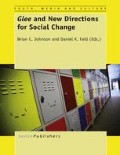Abstract
In recent years, questions of difference have been of the utmost concern in American consciousness. After 2011’s rash of high-profile LGBT youth suicides, teaching young people how to embrace difference became a top priority. In response, a glut of popular culture was produced that proclaimed the beauty of difference and the need for individuals to embrace their supposed flaws.
Access this chapter
Tax calculation will be finalised at checkout
Purchases are for personal use only
Preview
Unable to display preview. Download preview PDF.
References
Chidester, P. (2008). May the circle stay unbroken: Friends, the presence of absence, and the rhetorical reinforcement of whiteness. Critical Studies in Media Communication, 25(2), 157–174.
Cloud, D. L. (1998). Control and consolation in American culture and politics: Rhetoric of therapy. Thousand Oaks, CA: Sage Publications.
Cobb, J. N. (2011). No we can’t!: Postracialism and the appearance of a rhetorical fiction. Communication Studies, 62(4), 406–421.
Germanotta, S., Laursen, J., Blair, P., & Garibay, F. (2010). Born this way. On born this way. Santa Monica, CA: Interscope Records.
Hilderbrand, L. (2009, December 4). Stage left: Glee and the textual politics of difference. Flow. Retrieved from http://flowtv.org/2009/12/stage-left-Glee-and-the-textual-politics-of-differencelucas-hilderbrand-university-of-california-irvine/
Joseph, R. L. (2009). “Tyra Banks is fat”: Reading (post-)racism and (post-)feminism in the new millennium. Critical Studies in Media Communication, 26(3), 237–254.
Joseph, R. L. (2011). Imagining Obama: Reading overtly and inferentially racist images of our 44th president, 2007-2008. Communication Studies, 62(4), 389–405.
Ono, K. A. (2010). Postracism: A theory of the “post-” as a political strategy. Journal of Communication Inquiry, 34(3), 227–233.
Peck, J. (1994). Talk about racism: Framing a popular discourse of race on Oprah Winfrey. Cultural Critique, 27, 89–126.
Rockler, N. R. (2006a). “Be your own windkeeper”: Friends, feminism, and rhetorical strategies of depoliticization. Women’s Studies in Communication, 29(2), 89–126.
Rockler, N. R. (2006b). Friends, Judaism, and the holiday armadillo: Mapping a rhetoric of postidentity politics. Communication Theory, 16, 453–473.
Thornton, D. J. (2011). Psych’s comedic tale of black-white friendship and the lighthearted affect of “post-race” America. Critical Studies in Media Communication, 28(5), 424–449.
Winfrey Harris, T. (2011, April 27). When will Glee stop ignoring race? Racialicious. Retrieved from http://www.racialicious.com/2011/05/04/when-will-Glee-stop-ignoring-race
Editor information
Editors and Affiliations
Rights and permissions
Copyright information
© 2015 Sense Publishers
About this chapter
Cite this chapter
Lippman-Hoskins, M. (2015). Glee and “Born this Way”. In: Johnson, B.C., Faill, D.K. (eds) Glee and New Directions for Social Change. Youth, Media, & Culture Series. SensePublishers, Rotterdam. https://doi.org/10.1007/978-94-6209-905-0_8
Download citation
DOI: https://doi.org/10.1007/978-94-6209-905-0_8
Publisher Name: SensePublishers, Rotterdam
Online ISBN: 978-94-6209-905-0
eBook Packages: Humanities, Social Sciences and LawEducation (R0)

